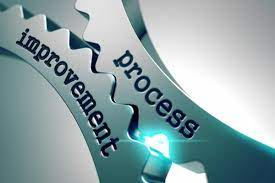In the manufacturing industry, the quest for improvement is a constant journey. Whether it’s about enhancing efficiency, reducing waste, or increasing profitability, manufacturing process improvement is a crucial step towards achieving these goals. But how can we effectively improve manufacturing processes? The answer lies in leveraging the right tools and technologies.
Understanding the Manufacturing Process
To delve into the world of manufacturing process improvement, it’s essential to understand some key terms. These include lean manufacturing, Six Sigma, value stream mapping, overall equipment effectiveness (OEE), and computer-aided design/manufacturing (CAD/CAM). Each of these terms represents a unique tool or technique that can significantly enhance manufacturing processes. A manufacturing process consists of several components, including raw materials, machinery, labor, and technology. Each of these elements plays a critical role in the production of goods. By improving these components, manufacturers can optimize their processes and achieve better results.
Process improvement in manufacturing is all about refining and adapting current processes to boost performance and efficiency. It involves identifying bottlenecks in your manufacturing process, eliminating waste, and implementing changes that lead to improved outcomes. By doing so, manufacturers can increase their operational efficiency, reduce costs, and enhance product quality.
Implementing Tools for Manufacturing Process Improvement
Choosing the right tool for your manufacturing process involves understanding your needs, evaluating different options, and making an informed decision. It’s crucial to consider factors like ease of implementation, cost-effectiveness, scalability, and compatibility with existing systems.
Ensuring Successful Implementation
Successful implementation of process improvement tools requires a well-planned strategy. It involves training staff, setting clear objectives, monitoring progress, and making necessary adjustments along the way. It’s also essential to maintain open communication with all stakeholders to ensure everyone is on the same page.
Measuring the Impact of Implemented Tools
Once the tools are implemented, it’s crucial to measure their impact. This can be done through key performance indicators (KPIs) like production rate, defect rate, and overall equipment effectiveness (OEE). By monitoring these metrics, manufacturers can assess the effectiveness of their improvement efforts and make necessary optimizations to their manufacturing process.
Challenges and Solutions in Implementing Manufacturing Process Improvement Tools
Implementing manufacturing process improvement tools can come with several challenges. These may include resistance to change, lack of training, budget constraints, and technical issues.
To overcome these challenges, manufacturers can provide adequate training, foster a culture of continuous improvement, invest in reliable technologies, and seek help from manufacturing process consultants. By doing so, they can ensure a smooth transition and maximize the benefits of their process improvement efforts.
You’re Already An Expert at Your Business
LillyWorks Protected Flow Manufacturing™ (PFM) is the best solution to manufacturing process improvement. With PFM, manufacturers gain the right kind of shop floor visibility, allowing you to prioritize tasks based on what needs to happen first, rather than what’s due first. This approach empowers you to drastically improve on-time delivery and optimize your production operations.
At LillyWorks, we take pride in developing products that are easy to implement and use. We are committed to providing training and knowledge transfer to ensure our customers can focus on doing what they do best. With PFM, we promise to help you take full advantage of our products, guide your team through the features for the best user experience, and provide peace of mind knowing that you don’t need to be a computer or cloud expert to benefit from our solution.
Improve your manufacturing operations and increase profits with the right solution – PFM, the solution for manufacturing process improvement.
Enhancing Manufacturing Processes
In conclusion, effective manufacturing process requires leveraging the right tools and techniques. By doing so, manufacturers can enhance their processes, improve product quality, reduce costs, and stay competitive in the market. As technology continues to advance, we can expect even more innovative tools and strategies to emerge, further revolutionizing the world of manufacturing. Contact us today to learn more about how we can help you on your journey towards manufacturing process improvement.
